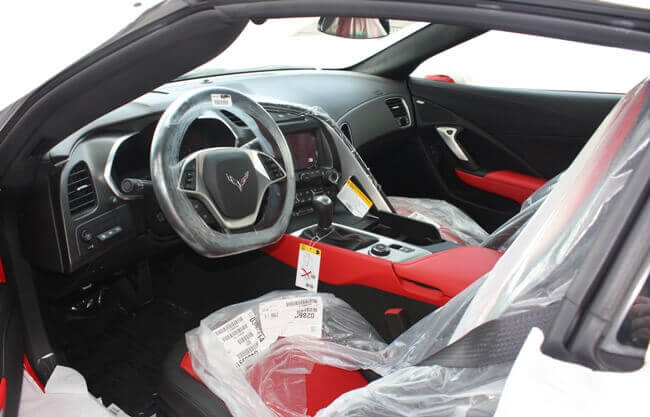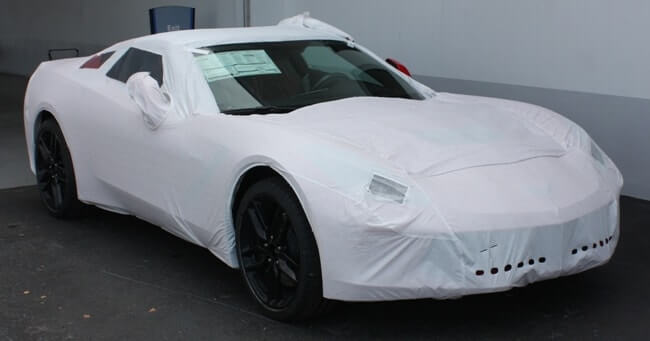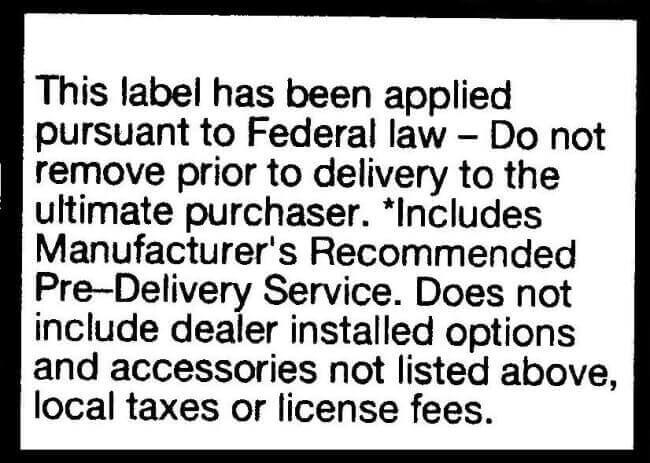PDI - Is This Dealer Fee Legit?
What Is PDI?
PDI stands for "Pre-Delivery Inspection." You will often see it referred to as dealer prep when you are looking at new car paperwork. Of course, knowing what it stands for doesn't really tell you what it is.
Essentially it is a set of tasks that the dealership must do after the car comes off the delivery truck and before they put it on the lot or deliver it to the customer. The manufacturers provide dealers with a checklist of what needs to be done.

They are supposed to do a cursory check of the function of all the features. They do things as simple as making sure the horn honks in addition to more complicated things like setting up satellite radio trial accounts (when equipped). There is normally a short road test specified to check that the transmission works properly and that there aren't any squeaks, rattles or other noises.
As you can see in the photo above, The seats and other interior parts are delivered wrapped in plastic or with plastic protectors on them. Part of the PDI process will be to remove all of this plastic.
The last thing they will do, once everything else checks out, is wash the car. You want your new car to look shiny and in showroom condition when you take it home. You don't want it to look like it has been on a delivery truck for a week.
Not All PDI is Created Equal
The time it takes to perform the PDI process varies from vehicle to vehicle. A base vehicle with few options can go through the process very quickly. There won't be many options to check the functionality of. They will remove the plastic coverings, give it a quick test drive and wash it.

For other vehicles, there is a lot more to do. For instance, the Corvette pictured above arrives in a shipping cover which has to be carefully removed. Additionally, since this particular vehicle had the Z51 performance package, there are actually parts shipped loose that need to be installed.
The more features that are installed, the more time it will take to check everything.
Why Does PDI Cost So Much?
The charge for PDI will usually be listed as "dealer prep" or something similar on the paperwork. It tends to cost several hundred dollars. Why? That is a very good question. The answer is because the dealer wants to add profit to the deal.
Outside of some very involved processes that require parts installation, the entire "dealer prep" doesn't take more than two hours. There are only going to be one or two employees doing the work.
If the dealer charges you $500 for this, you are essentially paying $250 an hour for the service. If you were paying a lawyer this might be considered a good deal. However, you are paying for work to be done by a couple of employees making less than $20 per hour. The dealer is pocketing at least $200 per hour for this work.
Don't Be Double Charged
On many vehicles, the cost of doing the PDI is already included in the MSRP. When it is, it is clearly stated on the window sticker as you can see in this example.

When this statement is on the sticker, the manufacturer is compensating the dealer to perform the work. If the dealer is charging you on a separate line of the contract, they are double charging for the service.
We believe that all "dealer prep" or PDI charges be negotiated out of every deal, regardless of whether or not the manufacturer includes it. When you go to a retail store, you don't pay a separate charge for the product to be unboxed and put on the shelves. That expense is included in the price.
Here is where a car salesman will write an angry email and say that the dealership has to cover their costs and that you don't negotiate the price of toilet paper at Wal-Mart. First of all, Wal-Mart doesn't charge each customer a different price based upon what they can get away with. Most importantly, we agree that a car dealership should make a profit. What we don't agree with is dishonest tactics like agreeing to a lower price and then sneaking in a ridiculous fee to make up for it.
Just refuse to agree to pay the PDI (or whatever they happen to call it). If they make something up and tell you it can't be removed or is permanently printed on the contract, be prepared to walk out.
Another way to deal with it is to ask about the fee upfront and add it to the price they agreed to so that you will know what the real price is. We talk about all of the strategies to avoid getting ripped off in our complete new car buying guide.
If you use TrueCar to get a guaranteed price certificate, it will disclose all fees up front. If the dealer has a prep fee, add it to the price so you can see what you are really paying. Get multiple quotes using other sites like RydeShopper and Edmunds so that you will have options if the negotiations get tough.

About The Author: Lyle Romer is a consumer advocate, Founding Contributor and Vice President of CarBuyingTips.com. A 20 years veteran of the auto industry with a high level of expertise, Lyle has been researching all aspects of the automotive sales industry.
Lyle's expertise and research played a vital role during the creation of CarBuyingTips.com in 1999 after years of industry research. He carefully observed every aspect of his own car buying experience as the internet began to take a foothold in the process. He also designed the site to make sure that consumers had easy access to the best consumer advocate education.
Lyle has been an auto industry insider since 1999. He also has worked with other automotive websites to help improve their offerings based upon feedback from CarBuyingTips.com users. He covers important industry events and gathers off the record sources while attending industry conventions.
Connect with the author via: Email







